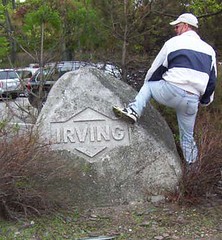
Charesl,
"Irving who, through his work with BCAPI, wondered why Saint John is plagued with so much poverty."
(I think many citizens can tell irving why there's so much poverty but I'm sure he already knows the answer to that question)
Wanted: Political will
Sandra Davis
Telegraph-Journal
Published 2007-01-04 | Page C1
Imagine a city where all children finish high school and later, become productive, tax-paying citizens.
The co-chairman of Saint John's Business Community Anti-Poverty Initiative (BCAPI) doesn't think that's a stretch.
All it takes, says Bill Gale, is the political will to make it happen.
There's already a movement in the city called Partners Assisting Local Schools (PALS) that has accomplished much of what government has, historically, not been able to do.
Through corporate partnerships, beginning with J.D. Irving, Limited, four schools that had few resources and even less spirit and self-confidence are becoming places of pride and a second home for their students.
Imagine, says Gale, what could happen if government joined in.
"The human resources, the money, is all there," said Gale.
"It will happen, but it's going to take a long time. Everything is there to cause it to happen.
"There's only one thing lacking in the province and the country - the will to do it. Government has to have the will to do it. It has to help make it happen."
PALs is the brainchild of industrialist J. K. Irving who, through his work with BCAPI, wondered why Saint John is plagued with so much poverty. The business group commissioned a study and discovered that more than 19,000 people in the city are poor - that's 35 per cent higher than the provincial and national averages and 145 per cent higher than the remainder of Greater Saint John.
Complicating the problem, the study found, is that 43 per cent of poor people are more than eight times more likely to be part of a single-parent family.
A picture was painted of a vicious cycle of poverty that saw kids dropping out of school and a high number of pregnant teens.
"You start thinking about what you can do and how can you help," said Irving.
As the business group gathered more information, it became evident, he said, that changes in attitude must happen early.
"You have to catch the children before they get into their teens," said Irving. "By the time they're in Grade 8, they should have their values and all of that pretty much set. Once you get to high school and beyond, it's pretty hard to change a group of people."
Prince Charles School is down the street from the Irving corporate offices. It was a natural starting base for PALS, and educators at the local school district level jumped at the opportunity.
Today, the corporate community brings PALS to four city schools - besides Prince Charles, the others are St. John The Baptist/King Edward in the south end, and Centennial and Hazen White-St. Francis schools in the north end. Spreading the program around Saint John is key, says Irving.
"If we could look after our youth here, give them self-esteem and get them interested in things, give it ten or fifteen years and it'll make quite a difference in the city. I hope the government will see the project in a good light and support it."
The link between low levels of literacy and poverty is not lost on J. Douglas Willms, director of the Canadian Research Institute for Social Policy at the Fredericton campus, University of New Brunswick.
The concentration of poor people in specific neighbourhoods stacks the deck against the children, he said.
"What Saint John has working against it is, when you concentrate kids from poor backgrounds together in the same school or classroom, they do much worse than they would if they were in mixed ability groups," said Willms.
"There's double jeopardy - they're at a disadvantage because they come from poor families, and they're also disadvantaged because they're not in mixed-ability settings. Kids who come from affluent backgrounds tend to do well in any setting."
The reason this finding is consistent, he said, is simple: if five or six students in a classroom of 25 are vulnerable, that's a big enough challenge for a teacher. If the whole class is vulnerable, it becomes an impossible task.
Willms believes strongly in the importance of volunteers and community advocates and mentors in schools - a hallmark of PALS.
"It needs to be a more general approach that involves families, teachers and the business community," he says, and must begin with the expectation that all kids are going to succeed.
"It starts out with a goal that asks, what will it take to have 95 per cent of our children finish Grade 3 with the ability to use reading to learn?"
Literature suggests that children identified as being at risk of failing school by Kindergarten or Grade 1 need 100 to 150 hours of augmentative instruction to catch up in groups no larger than three-to-one, said Willms.
With commercial tutoring programs running at $30 to $40 per hour, it would cost up to $6,000 to get each student on track, he said. While that may sound expensive, the larger picture suggests otherwise, says Willms. In fact, he said, studies have shown that $1 invested in literacy early on yields a $3 return later.
"Think about what it will mean if you reduce it from 25 per cent of kids that are significantly below grade level at the end of Grade 3, to five per cent.
"The price tag becomes much greater if you look at the cost in the longer term for health care, social welfare, or ending up in the criminal justice system."

6 comments:
They should keep their dirty money out of our schools.
No, they should pay their f&^%^%$ taxes so that it can get into the schools in the first place!
This is creepy stuff.
Notice how the end of the article focuses on "commercial tutors". Hmmm, privatizing education anyone? For $30 to $40 dollars an hour you'd be just as well to hire more teachers. That's what Vermont did to get their student-teacher ratio down to eight.
Notice also that according to the department of education Saint John has a far lower dropout rate than Fredericton or Moncton. Even the worst in Saint John, St.Malachys (at 4.7) is nowhere near Minto's 5.7 or Campbellton's 6.6.
The schools they are in now have ZERO dropouts on average, so it seems odd to look at poverty in an area, look at the school that has the highest poverty and say "f&^% them, we'll start a program at the schools where dropouts aren't a problem".
The other explanation, of course, is that it has nothing to do with dropouts at all. Dropouts have been continuously falling over the years, almost ten percent are due to 'employment', but notice how there is no effort to, say, not hire school age kids full time, or even better, enact legislation so people can't hire dropouts full time.
Notice also how the article is long on congratulations, but short on actual information. They don't even say what they do in the program. One of its touted 'successes' is that this poor area has growing enrollment. In other words, there are MORE poor families here, that hardly seems a good thing.
There is also conveniently no mention of just how much education those tens of millions of dollars that Irving got in its tax subsidy-it would have gotten a lot more than this program offers, and lots of those 'commercial tutors' too.
I couldn't even find a website for the program, except a page that shows the woman in charge of it used to write forestry courses for UNB while working for Irving. Any info out there on what they actually do? Maybe Tim Smith can go ask some kids or teachers!
The Irvings are the masters of public relations. That's why they give back to the community... it keeps people's mouths shut while they continue to dodge paying taxes, continue to pollute, continue their take-over of the media, etc.
Anyone who likes Irving always does because of what they do for the community. Tree planting, the nature park, the loyalist burial ground, etc. The money they put into the community is well spent because it means they can continue to run their business the way they do with minimal interference from the government or the public. It's a brilliant strategy, and the public continues to fall for it.
THE IRVINGS ARE NOTHING MORE THAN YOUR TYPICAL CON ARTIST SCUMBAGS AND THEY LOVE TO USE DECEPTION ON THE PUBLIC, END OF STORY!
So would you rather have YOUR income taxes go up to pay for these programs??
What is wrong with this? While yes, I think it's not right for this program to be needed in the first place, it's nice that SOMEONE is stepping up to the plate.
I don't work for Irving but they have been doing a HUGE amount of anti-poverty work in Saint John. What is so wrong with that? There is a huge not-so-distant future labour force crunch, isn't it in their best interests to help ensure there will be enough skilled people to fill the gaps??
Post a Comment